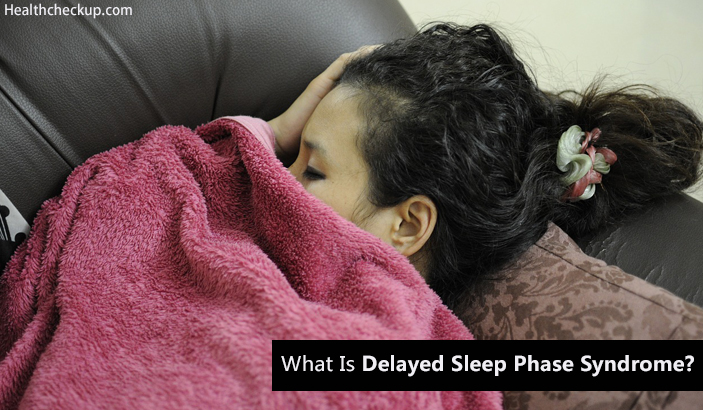What is Delayed Sleep Phase Syndrome
It’s a body disorder where one finds it difficult to fall asleep till very late in the night, one may fall asleep as late as 4 AM in the morning, and this may lead one to wants to sleep for extra hours in the morning which they can extend till the early hours of the afternoon. During the weekend’s people who are affected by this condition, tend to sleep longer up to later hours of the afternoon.
The condition can also be defined as a disorder whereby one‘s circadian rhythm or sleep sequence is postponed from the normal day or night sequence. This makes one to fall asleep after a long period of time and they tend to wake up much earlier than usual.
Delayed Sleep Phase Syndrome Causes
- Body Clock: The body has a type of internal clock which controls the sleeping sequence which helps to dictates the time when one is supposed to wake up and go to sleep. It is highly believed that, when you are suffering from delayed sleep phase, then the body clock is not working properly as required.
- Melatonin: Melatonin may also be the cause of delayed sleep phase syndrome. It is a hormone that is made by the body to assist it to regulate the internal body levels of melatonin. When one has the incorrect levels of melatonin this may lead to issues with their sleep. The computer screen light which is blue in color can also decrease somebody’s natural amounts of melatonin and keep them from being sleepy at night time. The amount of Melatonin rises during the nights and tends to cause sleep to someone.
- Age: People who are of young age especially the adolescents, at most times don’t tend to be so sleepy during the nighttime which makes them stay awake for too long, and this, in turn, causes the shift of their body clock.
Delayed Sleep Phase Syndrome symptoms
Some of the Symptoms which can be used to Identify patients Suffering from Delayed Sleep Phase Syndrome Include
- Failure to sleep at the right time. This normally manifests as insomnia, which may be increased by peer pressures such as the ones in teenagers due to excessive use of phones or browsing of the internet or staying up doing their homework.
- Failure to wake up at the expected time and lengthy daytime sleep. For school going children or adolescents with this condition, they may have an excessive fatigue during the day. This makes it hard for them to fall asleep early in the night and waking up at the right time for school.
- Depression and behavioural issues. People suffering from delayed sleeping phase syndrome may also suffer from depression and other psychiatric illnesses which may include behavioural abnormalities as an outcome of daytime fatigue and even school absenteeism. This may also lower the school performance due to the days they miss classes or slowness.
Delayed Sleep Phase Syndrome Diagnosis and Tests
It is diagnosed merely by describing the indications of one suffering from the condition and one’s sleep schedule. At times a non-persistent device which looks like a watch and commonly known as autograph is used to affirm somebody’s schedules of rest or activity. A through the night research or in another name a Polysomnogram is highly suggested to discard away any existence of sleep difficulties if somebody’s history suggests a high likelihood of them suffering from the disorder in one time of their life.
Advanced diagnosis or tests of melatonin or main temperature rhythms are mostly set aside to be carried out for research purpose on the condition.
Delayed Sleep Phase Syndrome Treatment
- By seeing a sleep specialist who may advice one to work on changing their sleep patterns to maintain sleep hygiene.
- The specialist also can encourage bright light therapy in the treatment of delayed sleep phase syndrome in which there is use of sunlight or a light box designed for the treatment of this condition. This treatment has given out good results for treating Delayed Sleep Syndrome Phase Disorder (DSPS) or Delayed Sleep Phase Disorder (DSPD). It entails exposing oneself to bright light in the early morning hours shortly after getting up, and strictly avoiding bright outdoor light in the late hours of the day. This has been shown to rearrange the schedules of persons suffering from this condition back to the usual normal schedule.
- Visiting a doctor is the first thing to do -Who may then suggest on treating somebody via slow scaling backward of one’s sleeping until they attain the required sleep time schedule.
- By Chronotherapy Treatment -Through this method a prescription by the doctor to delay somebody’s sleep schedule that postpones the time to sleep by one to two and hours, till the required sleeping time is attained. One has to maintain this attained sleeping schedule once they reach it.
Conclusion
Sleeping is one of the ways of relaxing our body but when one experiences sleeping problem they may never relax enough and this may affect their next day activity. Whenever individual experience sleeping problem the first step is that they should visit a physician to get delayed sleep phase syndrome test so that he or she can recommend the best treatment. If you find that you are suffering from this disorder worry less as there are various ways of managing it.
After Going Through the Article you Might be Interested Test your Knowledge of DSPS with this Delayed Sleep Phase Syndrome Questionnaire
- True or false? Bright light can both help and hamper efforts to begin new sleep patterns.
- True or false? DSPS is commonly accompanied by other sleep problems, for example, sleep-disordered breathing.
- True or false? Delayed sleep phase syndrome (DSPS) is defined as sleep delayed by at least five hours after conventional bedtime.
- True or false? ADHD symptoms and delayed sleep phase syndrome can be relieved with bright light therapy.
Medically Reviewed By








